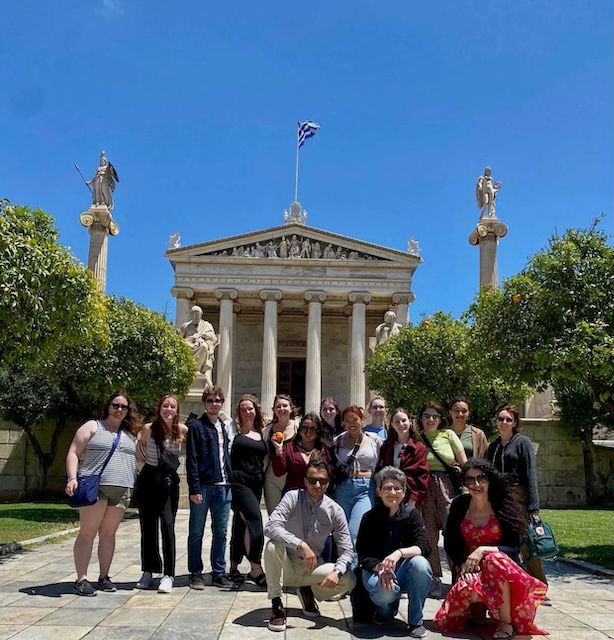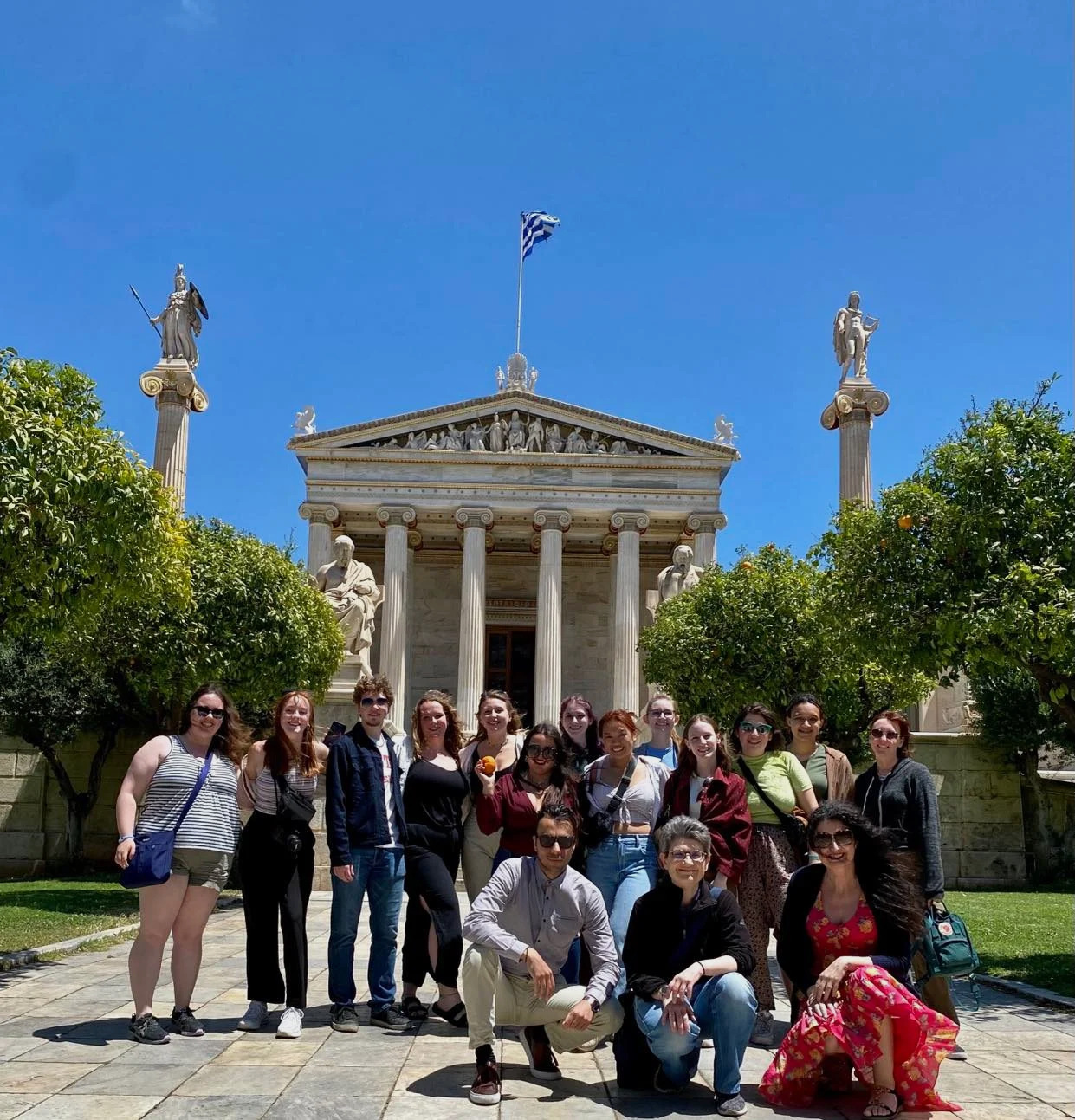
Student life in Greece
Student life in Greece is vibrant, diverse, and full of academic and personal growth opportunities. As a student in Greece, you’ll experience a blend of traditional culture, modern academic environments, and a relaxed Mediterranean lifestyle.

Student Accommodation
On-Campus Housing
Many universities in Greece provide limited on-campus accommodation for students, usually in dormitories or student residences. However, spaces are often limited, so many students opt to rent apartments.
Private Accommodation
Renting a flat or sharing an apartment is common, particularly in larger cities like Athens, Thessaloniki, or Heraklion. Rent is relatively affordable compared to other European cities, although costs can vary depending on the location. Sharing with other students is a popular option to reduce expenses.
Student Housing Networks
There are also private student housing options that cater specifically to international students, offering furnished rooms and utilities included.
Cost of Living
Greece is considered to have a relatively low cost of living compared to other European countries. This includes cheaper rent, affordable food, and public transportation.
Food
Greek cuisine is diverse, fresh, and delicious. Students often enjoy meals in traditional tavernas (restaurants) or cafeterias. Street food like souvlaki, gyros, and baklava is common and inexpensive. Supermarkets also offer a wide range of affordable products.
Public Transportation
Public transport, including buses, trams, and metro systems (especially in Athens), is affordable and well-connected, making it easy for students to get around.
Social Life and Culture
Nightlife
Greek cities, particularly Athens and Thessaloniki, are known for their vibrant nightlife. Students often enjoy going out for drinks, attending live music events, and socializing in the many cafes, bars, and clubs. Greek nightlife is usually relaxed, with a strong emphasis on conversation and social interaction.
Cultural Activities
Greece is rich in history and culture, and students have many opportunities to explore museums, archaeological sites, and historic landmarks, including the Acropolis in Athens, ancient Olympia, and the Temple of Apollo at Delphi. Additionally, Greek festivals, such as those celebrating Easter, the Greek Orthodox holidays, and regional music festivals, offer great opportunities to experience local traditions.
Sports and Outdoor Activities
Many students enjoy hiking, cycling, and swimming. Greece’s beautiful islands, beaches, and mountains offer excellent opportunities for adventure sports. University campuses also host sports clubs and events.
International Student Community
Greece is becoming an increasingly popular destination for international students, especially those pursuing degrees in English-taught programs. Greek universities often have support services for international students, including language courses, orientation programs, and help with bureaucratic processes.
English is widely spoken, particularly in larger cities and university settings, so most international students can easily navigate life in Greece. However, learning some basic Greek is always helpful and can improve your experience in social settings.
Student Organizations and Clubs
Clubs and Societies
Greek universities often have a variety of student clubs and societies related to academic interests, sports, or hobbies. Many students are involved in these extracurricular activities, which provide a great way to meet people and expand your social circle.
Political and Social Activism
Greece has a rich tradition of political activism, and many students participate in protests or movements related to social, environmental, or political causes. Student activism is common and is often centered around universities.
Student Discounts
Many places in Greece offer student discounts for transportation, museums, cinemas, and even restaurants. International students can also benefit from discounts with their student ID or special “student cards.”
Language
While many Greeks speak English, especially in urban centers and universities, Greek is the official language. Some universities offer programs in English, but knowing basic Greek can be helpful for everyday activities, such as shopping, interacting with locals, or traveling to less touristy areas.
Weather and Lifestyle
Greece’s Mediterranean climate is one of the country’s most appealing aspects. With long, hot summers and mild, wet winters, the weather is perfect for outdoor activities, beach days, and socializing in the sun. Many students take advantage of this to relax at the beach or enjoy outdoor cafes during the warmer months.
Public Holidays and Work-Life Balance
Greek students typically enjoy a healthy work-life balance. While university life can be demanding, Greek culture places a high value on spending time with friends and family. Public holidays, such as Independence Day (March 25th), Labor Day (May 1st), and various religious holidays, offer students a chance to relax and participate in local traditions and celebrations.
Challenges
Bureaucracy
One of the challenges faced by international students in Greece is navigating the bureaucracy, especially when dealing with residency permits, health insurance, and other administrative requirements. However, universities usually guide on these matters.
Language Barrier: While many people speak English, especially in urban areas, language can still be a barrier in smaller towns or when dealing with non-English speaking staff at banks, government offices, or other services.
Student life in Greece offers a unique blend of academics, culture, and social opportunities. Whether you’re drawn to the rich history, the warm Mediterranean climate, or the vibrant student scene, Greece is an excellent choice for both local and international students. With its welcoming atmosphere, affordable living costs, and world-class universities, Greece provides a fantastic environment for studying, socializing, and making lifelong memories.
Working and Getting a Job in Greece
Working as a student in Greece can be a rewarding experience, allowing you to gain practical skills, supplement your income, and immerse yourself in local culture. Greece has a relatively relaxed work-life balance, and there are various part-time job opportunities for students, especially in larger cities and tourist destinations. Here’s an overview of working as a student in Greece:
Work Permits and Legal Requirements
EU/EEA Students:
If you’re from the European Union (EU) or the European Economic Area (EEA), you do not need a work permit to work in Greece. You can work part-time or full-time as long as it does not interfere with your studies.
Non-EU Students
If you’re from outside the EU/EEA, you are allowed to work up to 20 hours per week during the semester and full-time during vacation periods (usually summer and Christmas breaks). To do this, you will need to apply for a work permit. Your university or a legal advisor can help guide you through this process.
Taxation: All students working in Greece must pay taxes on their earnings. If you are working part-time, the tax burden is usually light, but you must ensure that you register with the Greek tax authorities (tax office) and receive a tax number (AFM).
Jobs Available for Students
Hospitality and Tourism
Since Greece is a major tourist destination, especially in cities like Athens, and Thessaloniki, and on islands like Mykonos, Santorini, and Crete, hospitality jobs are very popular among students.
These might include
Waitstaff or bartenders at cafes, restaurants, or bars
Hotel receptionists or staff
Tour guides or assistants for tourist agencies
Kitchen assistants or cleaners
Retail
Many students work in retail shops, especially during the summer season when there is an influx of tourists. Jobs could include working as cashiers, sales assistants, or stock clerks in clothing stores, souvenir shops, or supermarkets.
Tutoring and Teaching
If you are proficient in languages (especially English, French, or German), you can offer tutoring services for children or adults. English-language tutoring is particularly in demand, as many Greek students seek to improve their English for exams or future job prospects.
Internships:
Many students, particularly those in business, engineering, and marketing fields, take internships in companies or institutions related to their field of study. These positions can be either paid or unpaid, but they often provide valuable work experience and networking opportunities.
Freelancing
Depending on your skills, freelancing could be a great way to earn money. Jobs like graphic design, web development, content writing, social media management, and translation services are in demand. Online freelancing platforms (e.g., Upwork, Fiverr) are also good sources of work.
University Jobs
Some universities offer on-campus jobs, including research assistant positions, administrative support, or library assistance. These jobs are flexible and directly related to your academic field.
Finding Work
University Career Services
Many Greek universities have career centers that help students find part-time jobs or internships. These centers often have job listings, internship opportunities, and networking events.
Online Job Portals: Websites like Kariera.gr, JobFind.gr, and LinkedIn feature listings for part-time and full-time jobs in Greece. Some international job platforms also have listings for Greece-specific positions.
Networking
Word of mouth is an effective way to find work in Greece. Many students secure jobs through friends, classmates, or social groups. Attending university events, career fairs, and local gatherings can help you meet potential employers or other students who know of job openings.
Tourist Season Jobs
During the summer, many businesses on the Greek islands or coastal towns hire extra help to accommodate tourists. If you’re flexible and open to moving to different locations, this can be a great option. Hospitality and service industry jobs are plentiful, and they often pay tips, which can supplement your earnings.
Work Pay Conditions
Part-Time Jobs
Generally, part-time work in Greece is quite flexible, especially in hospitality, retail, or tutoring. Hours can range from 10 to 20 hours a week during the semester, depending on your university schedule. During holidays or breaks, you can often work full-time.
Hourly Pay
The minimum wage in Greece as of 2024 is around €780 per month (gross) for a full-time worker. For part-time work, wages will typically be calculated on an hourly basis, ranging from €5 to €8 per hour, depending on the job type and location. However, some jobs, especially in the tourist sector, might offer higher pay, especially with tips.
Working Hours
The standard working week in Greece is around 40 hours for full-time employees, but for students, part-time work is common. Working hours in hospitality and retail are often split, meaning you may have a shift in the morning and another in the evening.
In hospitality and service industries, tips are a significant part of many workers’ income. Greek people are known for being generous tippers, particularly in tourist areas. Tips can significantly increase your total earnings, particularly if you work in restaurants, bars, or hotels.
Work-Life Balance
Greek culture tends to place a high value on leisure time and work-life balance. While students are often expected to prioritize their studies, there is also recognition of the importance of personal time and socializing.
Summer Jobs
Many students take advantage of the long summer break (June–September) to work full-time, particularly in tourist-heavy areas like the islands, which can help them save money for the upcoming academic year. During this time, you might also enjoy weekends at the beach or exploring Greece.
Challenges of Working in Greece
Language Barrier
While many Greeks speak English, especially in urban areas and tourism hotspots, knowledge of Greek is a major advantage when looking for a job. In smaller towns or rural areas, you may face difficulties if you don’t speak Greek fluently.
Seasonality
Jobs in tourism and hospitality can be seasonal, meaning that they may only be available during the summer months. During the off-season (fall and winter), finding part-time work might be more challenging.
Bureaucracy
Students from non-EU countries may face bureaucratic hurdles when applying for a work permit. It’s essential to ensure that all the necessary paperwork is completed correctly to avoid employment issues.
Taxation and Financial Management
Tax Number (AFM)
If you plan to work in Greece, you must apply for a tax number (AFM), which is required for employment, opening a bank account, or paying taxes. You can obtain an AFM at the local tax office with the help of your employer or university.
Bank Account
You will also need a Greek bank account for your salary payments. Most students open a bank account once they arrive in Greece, which is a simple process with proof of identity and residency.
Social Security Contributions
If you work in Greece, you will be subject to social security contributions. These deductions go toward your healthcare, pension, and unemployment benefits. However, international students who are working part-time often find these deductions are minimal.
ljslaJLKJDLKajdlkajLKDJLKAjdlkAJLAKAKL
You may also like

